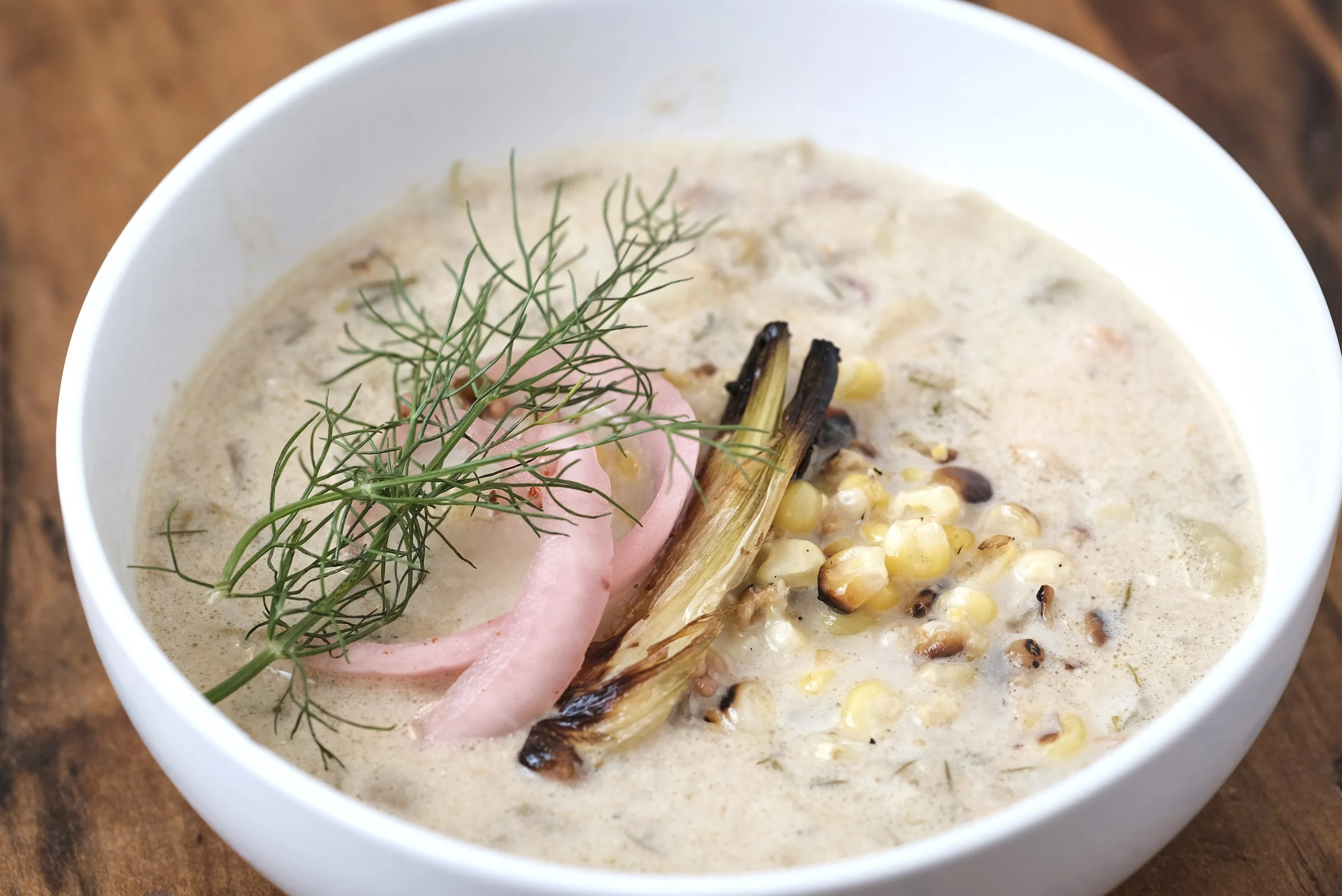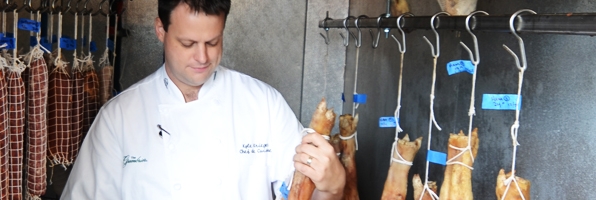Have Farm, Will Travel

By Barbara Elliott
Mike Costello and Amy Dawson are taking the farm-to-table concept to a whole new level with pop-up dinners they orchestrate from Lost Creek Farm in Harrison County. Their menus are built around seasonal ingredients available from their own farm and a network of local growers of quality pastured meats and heirloom vegetables. They describe it as a culinary roadshow that allows them to travel around the East Coast sharing stories about Appalachia’s rich cultural heritage through its cuisine.
Costello, a Kanawha County native, enrolled in culinary school in Charleston, SC, after graduating from high school in 2002, but was put off by the attitudes he encountered. “There was not an emphasis on the local food movement. The operating mentality at the time was that the farther away the food came from, the better it was. I got really turned off by that. I wasn’t a locavore, but if you are proud to be from Appalachia, it is not good to see people shaming West Virginia food as if it were not worthy. Even in the culinary world, we were being taught that you have to leave West Virginia to find quality or opportunity.”
Rather than buy into that mindset, Costello changed course and attended journalism school at WVU. “I always say that’s the best thing I could have done for my culinary career,” he says. “In journalism school, I developed a certain skillset as a storyteller, which I would not have learned in culinary school. I can, and have, learned technical kitchen skills by working in professional kitchens over the years—those skills can easily be acquired. But for our business, which is so rooted in the stories about how food represents people, culture, and place, storytelling is, perhaps, the most important tool in the kitchen.”
The day of we spoke, Costello was on his way to Fairmont State University to talk to culinary students. His message: “I want these students to have a different experience than I had 20 years ago. You don’t have to go to California to serve fancy bistro food. You can do it here, one hundred percent rooted in West Virginia.”
Trout Chowder (photo by Shawn Poynter)
Wild Mushroom Pate (photo by Shawn Poynter)
With their pop-up dinners, Costello and Dawson are illustrating that fact in a way that is deeply satisfying to both the palate and the soul.
“We have something here on par with everything in the world. That’s why we focus on the storytelling aspect. You can do a fancy dish, but with a story behind it. We may be creative, but we are still making basic dishes,” Costello explains. “A lot of West Virginians have distanced themselves from some foods because they are associated with poverty and desperation. Often times they are ashamed of the food they grew up with. We take foods that people may be ashamed of and flip the narrative around. For example, chow-chow is a symbol of people being very resourceful within very limited means. They created something delicious and beautiful.”
Delicious and beautiful is an apt description of a Lost Creek dinner. Costello’s inventive entrees are paired with breads and desserts baked by Dawson, who grew up down the road from Lost Creek Farm when it was her grandparents’ home place. She has resurrected recipes handed down for generations in her family and has mastered the alchemic magic of salt-rising bread. For an event last winter, their menu included cider brined pulled duck, grilled salt rising toast, woodland mushroom and cabbage pierogi, chopped and pickled pole beans, crispy pork jowl and buttermilk black walnut cake.
Depending on the time of year, the menu will be entirely different. “An April or May event is a heck of a lot different from one in August or September due to the variety of ingredients available,” Costello says. “We do a lot of wild harvesting and foraging. In the spring, we harvest ramps and morels, later in season we may use chanterelles or paw paws. That’s one of the things we like about working with the seasons. You never know what you will find. You may be planning on using morels, but you have to change course if it’s a bad year for morels. Our approach embodies something essential to Appalachian cuisine—working with what is within your means and what you have available.”
Heritage Pork Porchetta (photo by Shawn Poynter)
Flexibility is not only a key to the creation of menus, but it also comes in handy in adjusting to a different venue for every event. Take for example the Dinner on the Bridge event in Alderson last summer. Although Costello had carefully monitored the weather forecast to make sure it was clear, a huge thunderstorm struck as the diners were completing the fourth course. “Everyone had to evacuate to nearby church basement. It wound up being fun in a way. It was a great team building exercise,” he laughs.
Even with the challenges involved with cooking in different kitchens under varying circumstances, Costello thinks it is a good thing that Lost Creek Farm is not operating a restaurant.
“Our business model is to do one to two events a week in our busy season. If we had a restaurant, we couldn’t sustain that level of output for five or six days a week. The volume would be so high that we could not get enough produce and meat. Our suppliers are spread out, and there are not a lot of options for bulk purchasing. Our prep involves driving to farms and picking up ingredients. No truck will stop by once a week to deliver to us,” he explains.
Although the travel schedule can be brutal, it means that people from Tennessee to Washington, D.C. can experience the food and stories that make Lost Creek meals so distinctive. Events are sponsored by a variety of organizations and destinations, including Hawk’s Knob Cider and Meade in Lewisburg, which has hosted two pairing events in the last year.
Fall is the busiest season for this well-traveled duo. Costello emphasizes that they are not a food truck, but they do travel with their own pots, pans, knives, and specialty tools in addition to their home-grown ingredients. Constant travel makes it challenging to maintain the farm, where they raise heirloom vegetables such as Mortgage Lifter tomatoes, Bloody Butcher corn, Fat Horse pole beans, and Candy Roaster squash. “We learned a valuable lesson last year that we need a week or two off in August or the garden will be overtaken by weeds,” he remarks.
Their unique approach to telling the story of Appalachian food put Lost Creek Farm in the national spotlight last year when it was featured on the late Anthony Bourdain’s “Parts Unknown” program on CNN. But Costello says it is the bond formed with West Virginians who attend their events that is the most gratifying aspect of the venture.
“Food is really about people and place,” he says. “We are starting to change the way people look at food and tradition. People talk to us with tears in their eyes and tell us they never thought of it that way. They never wanted to eat those foods again. That’s the thing. It changes the way we see ourselves.”







